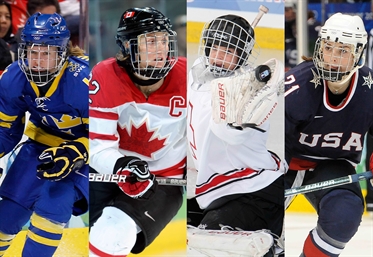Time to play
Time to play
Storylines of the women's ice hockey tournament

 From left: Veteran Olympians Pernilla Winberg, Hayley Wickenheiser, Florence Schelling, and Hilary Knight are back in the medal hunt in Sochi. Photos: HHOF-IIHF Images
From left: Veteran Olympians Pernilla Winberg, Hayley Wickenheiser, Florence Schelling, and Hilary Knight are back in the medal hunt in Sochi. Photos: HHOF-IIHF Images
1) Will Canada’s reign continue?
Never mind that the United States defeated Canada in four out of their six pre-Olympic exhibition games between 12 October and 30 December. Historically, Canada still holds a big edge where it counts most: at the Winter Games.
Dating back to 11 February, 2002, the Canadian women have won 15 straight games en route to gold in 2002, 2006, and 2010. Their last loss was to the U.S. in the 1998 gold medal game in Nagano – when Bill Clinton was still in the White House. The Americans have won four of the last five Women’s World Championships, but they’re still bitter over the Olympic drought.
2) How will Dineen do for Canada?
The 12th December resignation of Canadian head coach Dan Church due to philosophical differences with management came as a shocker less than two months before Sochi. His replacement, former NHL player and coach Kevin Dineen, brings a great hockey mind and a will to win. Ex-Hartford teammate and current TSN analyst Ray Ferraro described the 50-year-old as “an incredible person,” adding: “To know Kevin is to like him.”
Still, even given Dineen’s background as a 1984 Olympian and two-time IIHF World Championship silver medalist (1985, 1989), he has little time to get the pulse of this tight-knit group. His hiring could pay off perfectly or backfire big-time.
3) Does Hayley still have it?
Continue reading
For years, Canadian forward Hayley Wickenheiser was deservedly hailed as the best female player in the world. Along with teammate Jayna Hefford, the 35-year-old is poised to play in her record-setting fifth Olympics, and no one else is even close to her all-time mark of 46 points.
Lately, though, some have suggested she’s lost a step. Multiple injuries limited the Shaunavon, Saskatchewan native to three games and zero points at the 2013 Women's World Championship in Ottawa. Before the Olympic roster announcement, there was even speculation she might be excluded. Hyper-competitive, Wickenheiser will aim to prove her critics wrong.
4) Is Amanda Kessel 100 per cent?
The younger sister of Toronto Maple Leafs star Phil Kessel, this highly skilled 21-year-old forward absolutely tore up NCAA hockey last season with the University of Minnesota Golden Gophers. She won the Patty Kazmaier Award as MVP. Not only did she pot a nation-leading 101 points in 37 games, but at the 2013 Worlds, she also paced Team USA with seven points and scored the 3-2 winner against Canada in the final.
Amanda Kessel is essential to America’s hopes of defeating Canada with youth and speed. So the fact she spent much of the fall rehabbing a lower body injury has to be a concern. She's said she's "feeling good" at this point. Coach Katey Stone will need Kessel going full steam come 8 February, when the U.S. opens versus Finland.
5) Can Russia medal at home?
For Olympians, medaling at home is a once-in-a-lifetime opportunity. That’s why host Russia has invested heavily in its usually pedestrian women’s hockey program. With ex-NHL star and three-time Olympian Alexei Yashin as general manager, the Russians achieved a bronze medal at last year’s Worlds. It was just their second medal ever after 2001’s bronze.
Russia could do it again in Sochi. But it’ll need superlative performances from everyone from veteran snipers Yekaterina Smolentseva and Tatyana Burina to goalie Anna Prugova. There’ll be stiff competition for third place. At the recent Six Nations Cup, Finland beat Russia 4-3 in group play and blanked Sweden 4-0 in the final.
6) Has the competitive gap narrowed?
When Canada hammered Slovakia 18-0 to open the 2010 Olympics in Vancouver, it provoked a torrent of media questions about whether the top nations were just too good for the lower-ranked ones. Of course, in international men’s hockey, Canada also used to obliterate most of its Olympic foes from 1920 to 1952.
It took time to narrow the gap, and women’s hockey is no different. Still, one hopes that Switzerland will make a respectable stand against Canada in its 8th February opener, and that Japan will do likewise against Sweden the following day. It’s good to see progress.
7) Who’ll be the underdog goalie sensation?
Typically, Canadian and American goalies post the best numbers at the Olympics, supported by world-class defenders. But usually, a netminder from an underdog nation also leaves a powerful impression.
For instance, think of the heroics of China’s Hong Guo in 1998, limiting Canada to two goals and Sweden to one. In 2006, Switzerland’s Florence Schelling had a remarkable 93.9 save percentage and 2.40 GAA. And remember Kim Martin’s dynamic play for Sweden in 2006, making 37 saves in the miraculous 3-2 semi-final shootout win over the Americans that led to a silver medal. In Sochi, surely somebody will face 100 shots in two games and do all right for herself.
8) How will the new format play out?
This year, the top four teams from the 2012 IIHF World Ranking (Canada, United States, Finland, Switzerland) will be in Group A, while the fifth- and sixth-ranked nations (Sweden and Russia) will be in Group B along with successful qualifiers Germany and Japan.
While the Americans and Canadians are expected to finish 1-2 in Group A and receive byes to the semi-finals under the new format, a loss by either one to the Finns is a slight possibility, and that could open the door for a quarter-final upset. You never know.
9) Which Olympic rookies will shine?
Could McGill University forward Melodie Daoust steal the show in her debut with Canada’s national team after being named rookie of the year and MVP in back-to-back Canadian university seasons? Besides Amanda Kessel, there’ll be other intriguing first-timers on the U.S. roster, including forward Lyndsey Fry, the first Arizona native to play Olympic hockey, and defenceman Lee Stecklein, the youngest American at age 19.
Swiss blueliner Lara Stalder has been a rookie standout with the University of Minnesota-Duluth’s women’s team and could continue her prowess in Sochi. Another NCAA debutant, Finnish forward Susanna Tapani of the University of North Dakota, should also be on your radar.
10) What will it mean for the game?
No matter who wins women’s hockey gold in Sochi, there’ll be an upsurge in girls wanting to play hockey in the victorious nation afterwards. And that’s good news for anyone who loves this growing global game.
Back to Overview







































